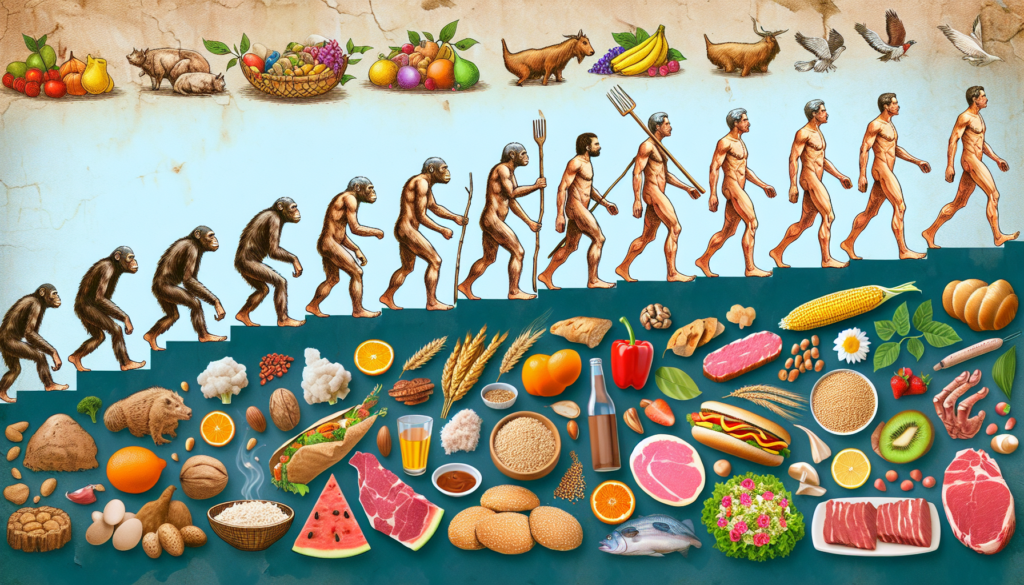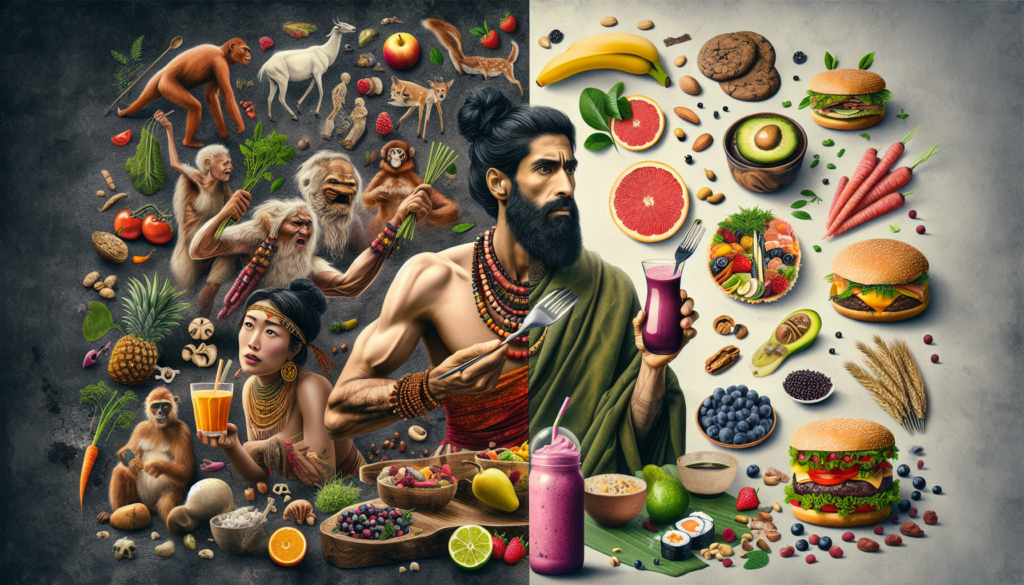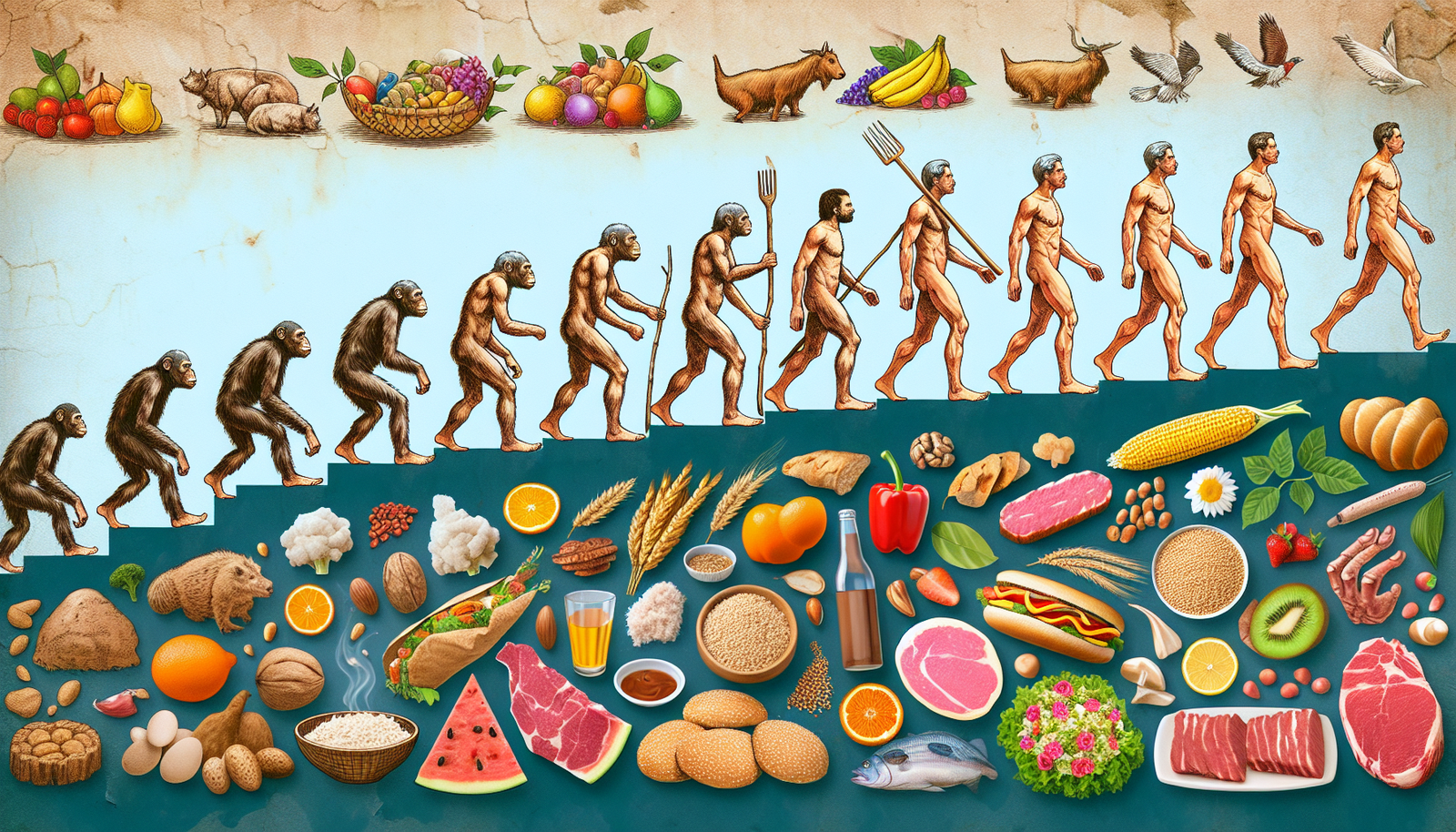Did you know that the human diet has gone through a fascinating journey of evolution? From our early ancestors consuming a hunter-gatherer diet to the modern-day adoption of processed and convenience foods, the way we eat has drastically changed over time. This article explores the various stages of the human diet’s evolution and how it has shaped our biology and health. Get ready to embark on a captivating journey into the historical timeline of our dietary habits.

Introduction to Human Diet
Throughout history, the human diet has undergone many transformations, reflecting changes in lifestyle, technology, and cultural practices. From the early days of prehistoric diets to the modern era of convenience foods, our understanding of what constitutes a healthy diet has evolved significantly. This article will explore the various stages of the human diet’s evolution and the factors that have influenced these changes.
Early Human Diets
Prehistoric Diets
In the early days of human existence, our ancestors primarily subsisted on a diet of wild plants and animals that were readily available in their surroundings. This prehistoric diet consisted of nuts, seeds, fruits, vegetables, and lean meats obtained through hunting and gathering. The availability and diversity of food sources varied depending on the geographical location and seasonal conditions, leading to regional differences in diet composition.
Hunter-Gatherer Lifestyle
As humans transitioned from nomadic hunter-gatherers to settled communities, the hunter-gatherer lifestyle continued to shape their diets. With the advent of agriculture, people began cultivating crops and domesticating animals. However, hunting and gathering remained an important part of their food acquisition strategies. The hunter-gatherer diet was characterized by a diverse range of foods, including grains, legumes, fruits, vegetables, nuts, seeds, fish, and game meats.
Introduction of Fire and Cooking
One significant development in early human history was the mastery of fire and the practice of cooking. The ability to control and utilize fire allowed our ancestors to enhance the flavor, texture, and nutritional value of their foods. Cooking not only made certain foods more palatable but also facilitated the consumption of a wider range of ingredients. This innovation marked a major milestone in dietary evolution, as cooking increased the bioavailability of nutrients, making it easier for early humans to meet their energy and nutritional needs.
Agricultural Revolution
Transition to Farming
The agricultural revolution represents a crucial turning point in human history, as it marked the shift from a hunter-gatherer lifestyle to settled farming communities. With the cultivation of crops such as wheat, barley, rice, and corn, humans could rely on farming as their primary means of sustenance. This transition led to a more stable food supply, enabling larger populations to thrive. However, it also resulted in a shift towards a more plant-based diet, with a reduced emphasis on animal protein.
Impact on Diet
The agricultural revolution transformed the composition of the human diet by introducing staple crops as dietary staples. These crops provided a reliable source of carbohydrates, but the overall diversity of food intake decreased compared to the hunter-gatherer period. While the introduction of farming improved food security, it also brought about negative health consequences. Switching to a predominantly grain-based diet led to increased rates of dental caries, malnutrition, and chronic diseases associated with nutrient deficiencies.
Industrialization and Modernization
Processed and Convenience Foods
The advent of the industrial revolution in the 18th century paved the way for radical transformations in the human diet. As urbanization and technological advancements progressed, the food industry capitalized on mass production and the development of preservation techniques. Processed and convenience foods became increasingly available, offering convenience, longer shelf life, and affordability. However, these foods often contained high levels of unhealthy additives, preservatives, and refined ingredients, leading to a rise in diet-related health issues.
Modern-Day Diet Challenges
In the modern era, the human diet faces numerous challenges that have arisen due to our fast-paced, convenience-driven lifestyle. People are consuming more processed foods, high in added sugars, unhealthy fats, and sodium, while lacking essential nutrients. This shift has led to the alarming increase in obesity, diabetes, cardiovascular diseases, and other chronic conditions. Additionally, sedentary lifestyles and lack of physical activity further compound these health issues.

Recent Trends Towards Healthier Diets
Rise of Vegetarianism and Veganism
In recent years, there has been a notable increase in the adoption of vegetarian and vegan diets. These dietary choices not only prioritize plant-based foods but also promote ethical, environmental, and health considerations. Vegetarian and vegan diets typically emphasize fruits, vegetables, whole grains, legumes, nuts, and seeds, providing ample vitamins, minerals, fiber, and antioxidants. These dietary approaches have been associated with numerous health benefits, including reduced risk of heart disease, certain cancers, and obesity.
Focus on Whole Foods and Plant-Based Diets
Another emerging trend in healthy eating is the focus on whole foods and plant-based diets. This approach emphasizes the consumption of minimally processed, nutrient-dense foods, such as whole grains, fruits, vegetables, legumes, and lean proteins. By prioritizing these unprocessed options, individuals can reap the benefits of essential nutrients while minimizing the intake of added sugars, unhealthy fats, and artificial ingredients. Whole foods and plant-based diets have been linked to improved weight management, lower risk of chronic diseases, and enhanced overall well-being.
Paleo and Low-Carb Diets
The paleo and low-carb diets have gained popularity in recent years, offering alternative approaches to healthy eating. The paleo diet seeks to mimic the types of foods consumed by early humans during the Paleolithic era, focusing on lean meats, fish, fruits, vegetables, nuts, and seeds while avoiding processed foods, grains, dairy, and refined sugars. Low-carb diets, on the other hand, prioritize limiting carbohydrate intake and increasing the consumption of healthy fats and proteins. These diets have shown promising results in weight loss, improved blood sugar control, and heart health markers. However, it is essential to approach these diets with caution and ensure proper nutrient balance.
Future Outlook
Sustainable and Ethical Food Choices
As we move towards the future, sustainable and ethical food choices are likely to play a more significant role in the human diet. With growing concerns about climate change, deforestation, and animal welfare, individuals are increasingly seeking out eco-friendly and ethically sourced foods. This shift towards sustainable diets, which focus on plant-based options, local sourcing, and reduced food waste, offers a potential solution to combatting environmental degradation while promoting health and well-being.
Genetic Modification and Food Technology
Advancements in genetic modification and food technology present opportunities for further innovation in the human diet. Genetic modification has the potential to enhance the nutritional content of crops, improve disease resistance, and increase crop yields, ensuring a more sustainable and resilient food supply. Additionally, food technology innovations such as lab-grown meat and plant-based alternatives offer alternatives to conventional animal agriculture, addressing concerns related to animal welfare and environmental impact.
Personalized Diets and Nutrigenomics
The future of the human diet may also see an increased focus on personalized nutrition based on individual genetic makeup and dietary needs. Nutrigenomics, the study of how individual genetic variation influences responses to nutrients, holds promise in tailoring diets to improve health outcomes. Personalized diets can account for genetic predispositions to certain conditions, optimize nutrient absorption, and minimize dietary risks. This individualized approach to nutrition could revolutionize the way we plan and consume our diets, optimizing health benefits and mitigating the risks of chronic diseases.
In conclusion, the evolution of the human diet reflects the various advancements in technology, lifestyle changes, and cultural practices throughout history. From prehistoric diets and the hunter-gatherer lifestyle to the agricultural revolution, industrialization, and modernization, each stage has brought about unique challenges and opportunities. Recent trends towards healthier diets, such as vegetarianism, whole foods, and low-carb diets, offer promising avenues for improved health and well-being. Looking towards the future, sustainability, genetic modification, food technology, and personalized diets represent exciting possibilities in shaping the human diet for optimal health and longevity.

